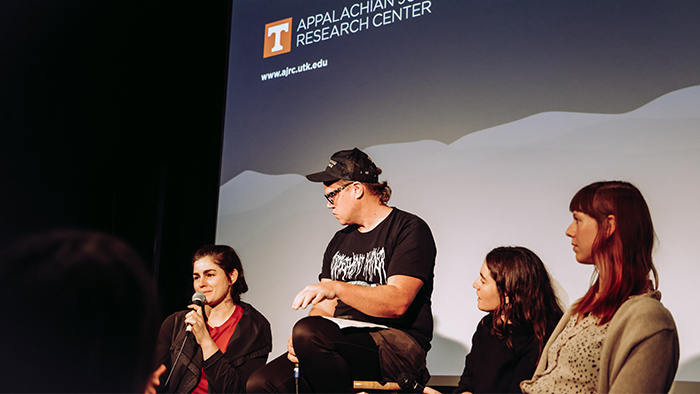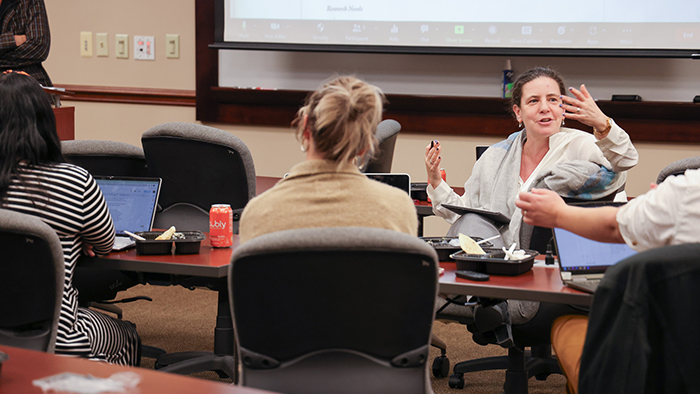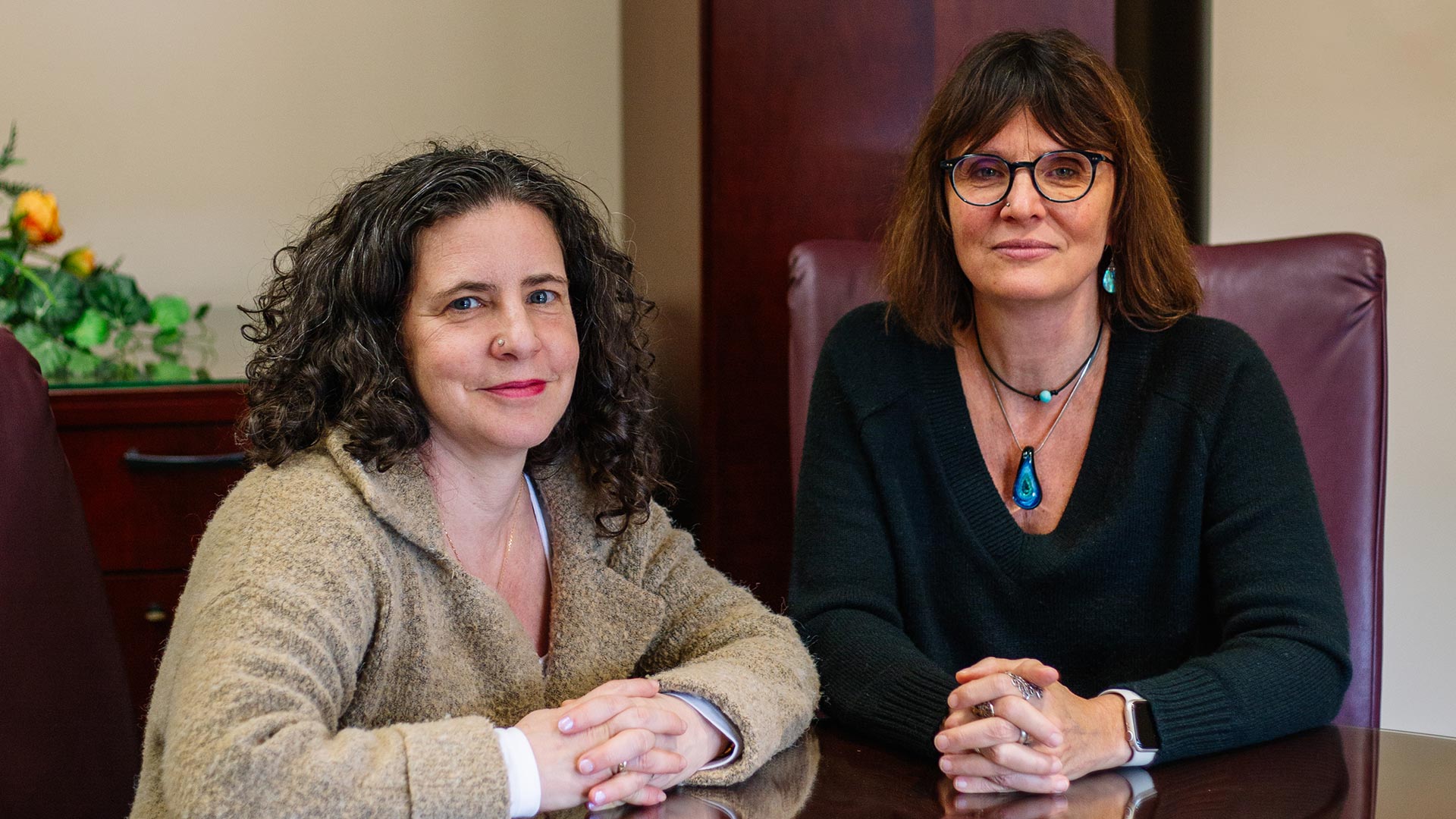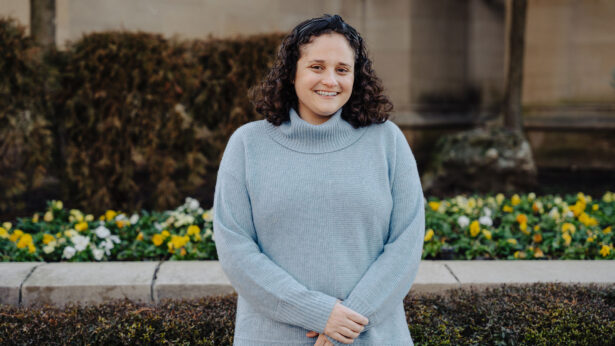This fall, Han Lemberg, a UT College of Law student and a graduate research assistant with the newly formed Appalachian Justice Research Center (AJRC), is taking part in an AJRC lab practicum, “Community Safety Interventions with the Eastern Band of Cherokee Indians.”
“We want to come up with a risk-assessment tool for domestic violence,” says Lemberg, “to determine when it’s safe to go home and which interventions are appropriate.”
In early spring, the AJRC met with Judge Sunshine Parker (Knoxville ’04, ’06, ’14), a UT alumna in law and social work, and other Eastern Band of Cherokee Indians (EBCI) members who worked on the Tribal Health Improvement Plan about the tribe’s community justice research needs. Out of that developed a project on domestic violence and how the court and tribal health system might better address the issue. Throughout the semester, the practicum group—combining law students, graduate students and undergrads—will collaborate with EBCI leaders, scholars, organizers and people who have survived and committed domestic violence to identify best practices in violence intervention that are specific to the cultural values of the Cherokee.
“We have Cherokee public health officials doing the work with us, as community researchers,” says UTK Sociology Professor and AJRC Co-Director Michelle Brown, the instructor for the lab practicum, one of four hosted by the AJRC this fall. “The course content, of course, focuses on this very complex thing we call domestic violence, but it also will dig deep into intergenerational trauma connected to settler colonialism, racism and alternative pathways to healing and accountability long practiced by the Cherokee. We are also doing a legal analysis of sovereignty, tribal law and its intersection with federal and state-level law and how it impacts tribal efforts to achieve safety.”

Brown and Law Professor Wendy Bach conceived the idea of the AJRC in the aftermath of the killing of George Floyd, when community members called upon them for research support. This led them to co-teach a practicum, “Visions of Justice,” focused on community safety needs. They launched the AJRC in July 2023, assembling affiliate faculty and a board of advisors made up of leaders of community organizations and leading scholars, obtaining research grants and conducting ongoing research since February.
“Requests for research projects are pouring in,” says Brown. “The teaching queue for the lab is two years out.”
“We are at capacity.” Bach adds, “We are dedicated to long-term commitment, research/community participation that is consistent and ongoing. We don’t simply supply research. We are rethinking at the university level what research means, consistent with our land-grant mission to rural communities. The labs are a mechanism for this work.”
Different Paths Toward the Arc of Justice
Bach the law professor and Brown the criminologist arrived at their passion for addressing Appalachian community struggles from different backgrounds.
Bach grew up as the daughter of academics—a biochemist mom and an immunologist dad whose family had fled the Holocaust. “I was raised to believe that you should use whatever you have to make the world a better place,” says Bach. Born in Madison, Wisconsin, she spent her middle school years in Washington, D.C., finished high school in St. Paul, Minnesota, and got her B.A. and M.A. in English from the University of Pennsylvania.

In an unpaid internship after her graduation, she found herself supporting programming in homeless shelters. “I would chat with people, and it was bureaucracy after bureaucracy, barrier after barrier, and the law seemed to be a place where I could use my skills to untangle some of those problems.”
After NYU Law School, she directed the Homelessness Outreach and Prevention Project at New York’s Urban Justice Center and was a staff attorney with the Legal Aid Society of Brooklyn. She taught at the City University of New York School of Law for five years and joined UT in 2010. Her book Prosecuting Poverty, Criminalizing Care came out in 2022.
Brown grew up in southern Indiana, near the Kentucky border. She and her father’s family are members of the Cherokee Nation of Tahlequah, Oklahoma. Her mother’s family are in the Appalachian mold of white working poor.
“The arc of justice for me originates from being raised in poor, rural, fundamentalist religious contexts, on both sides of my family, that were intensely structured by scarcity, prohibitions and punishment,” says Brown.
“It is grounded as well in my own relationships to family members whose lives and deaths were marked by addiction, poverty and criminal legal/carceral systems—some caught up in these systems, others working in it. Their stories and lives, cut short, were also framed by liberation questions and pursuits: How do we get free of these systems? How do we flourish, with accountability to others and the land we live on?
“Those things continue to ground my work every day, particularly in relation to transformative justice, which seeks to respond to harm without increasing harm, while working to address the structural/root causes of harm and violence. It’s a deep and daily work of awakening across a lifetime.”
A first-generation college student, Brown earned three degrees from Indiana—her B.A. in comparative literature, with certificates in film studies and French; her M.A. in criminal justice; and her joint Ph.D. in criminal justice and American studies. She taught criminology and sociology for six years at Ohio University and came to UT in 2011.
The transdisciplinary Appalachian Justice Research Center brings together faculty, students and community partners to address persistent and regional problems.
At UT, Bach and Brown each became involved in community organizations.
“We were always running into each other,” says Brown. “Doing housing advocacy, community safety work, organizing, certain faculty members were always showing up.”
“Sometimes we would bring our students along,” adds Bach. “We wanted a space that could house that work, involving law students, graduate students, undergrads. The center is our attempt to build that infrastructure and organization, part of the work of the university space for researchers to connect with folks in the community and the region.”
Bach and Brown set up the AJRC around four main areas of study:
- Community safety
- Land justice
- Housing and community stability
- Health justice
- Land justice issues present some of the most characteristic regional issues.
“A central problem in Appalachia,” says Bach, “is, who owns the land? Often lands are owned by external folks with the value being extracted through lumber, coal and now fracking. Because of unstable titles and the generational dividing up of parcels, family members own 1/18th, 1/16th of the land without legal instruments. They are vulnerable to developers, and it’s difficult for a person to capitalize on the ownership.”
In the Clearfork Valley in Northeast Tennessee, the AJRC is conducting multidisciplinary research projects in collaboration with community partners like the Woodland Community Land Trust and Southern Connected Communities Project to address the quandaries of land use and empower rural communities. How, for example, might former coal mine sites be reclaimed in a way that supports both the environment and the economic needs of the communities in the region?
Landscape Design Assistant Professor Scottie McDaniel is working with graduate students to propose alternative methods of land use in the valley. Geography and Sustainability Assistant Professor Gabe Schwartzman is collaborating with Tennessee Appalachian Communities in his research in energy-transition landscapes.
Two other land-use projects pertain to the proposed siting of a federal medium-security prison in Letcher County, Kentucky, and two prisons sited in Wise County, Virginia.
In Letcher County, the federal comment period was last spring.
“Folks in Letcher County who are interested in land use reached out to us,” says Brown.
With empirical research, Sociology Assistant Professor Lindsay Shade and advisory board members Sylvia Ryerson and Judah Schept are researching whether the prison, slated to cost a half a billion dollars, is the best use of the land for empowering the local economy against other social costs on the community.



